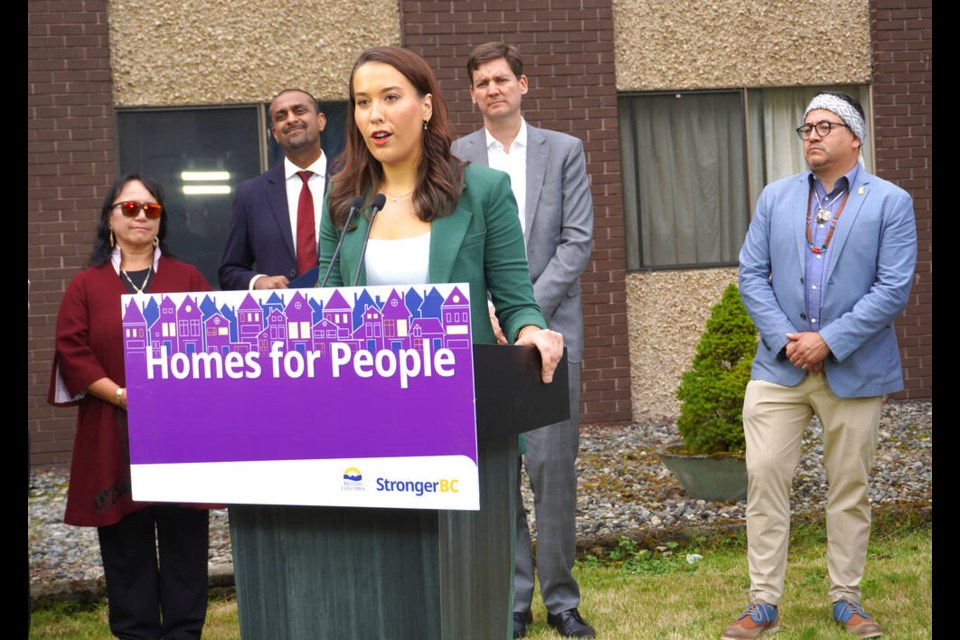With the purchase of two older apartment buildings in North Vancouver and Squamish, the province says it has now taken 1,500 rental units off of the private market and put them into the hands of non-profits.
Premier David Eby made the announcement outside the Ocean View Apartments, a 1967 three-storey walk-up in North Vancouver's Lower Lonsdale area, which has been acquired by the Hiy̓ám̓ ta Sḵwx̱wú7mesh Housing Society with capital supplied, in part, by B.C.’s Rental Protection Fund.
In 2023, the Eby government announced the launch of the $500-million program, which operate's at arm's length from from the provicial government and seeks to buy up older rental buildings – ones that tend to have the cheapest rents – and extend their lives rather than see them redeveloped for much costlier market rate condos or rentals.
“That’s more than 2,500 British Columbians that have had the experience of seeing their building go up for sale and then the relief of knowing that they and their neighbours are protected for the long term,” Eby said. “Nobody in this province should live in fear of losing their housing or having the rent increase dramatically in ways that they can’t afford.”
Tenants in the buildings today are paying rents that are about 50 per cent below market rates for the area – less than $1,300 for a one-bedroom and $1,600 for a two-bedroom at the North Vancouver property.
Two of the building’s youngest tenants, aged about three and five, watched the speechifying politicians and dignitaries at the announcement from their upper floor balcony.
Longtime Ocean View resident Steve Frazer said there was a palpable sense of relief when the tenants received a letter from Hiy̓ám̓ confirming that the non-profit would not be evicting them or redeveloping.
“There are many families here, and I’m sure they are all very happy to see they’ve got a little bit of protection,” he said.
The purchase prices for the North Vancouver and Squamish properties were about $13 million and $7 million, respectively.
Typically, the Rental Protection Fund provides between 40 to 60 per cent of the needed cash for the purchase, with the rest coming from the non-profits’ own capital or loans, said Katie Maslechko, CEO of the Rental Protection Fund. The deals are structured to ensure that rents can cover the non-profits’ mortgage payments and expenses, plus enough to build up capital reserves.
Maslechko said all of the buildings have been carefully inspected for deficiencies so the non-profits know exactly how much upkeep and upgrades they’ll need to remain viable and to ensure the projects pencil out.
The purchase of Ocean View comes with a grant of almost $800,000 to upgrade the building’s plumbing, boiler and windows. The Squamish apartment will receive almost $1 million to extend its life.
B.C. Rental Protection Fund now a major player
Maslechko said they have been overperforming on the Rental Protection Fund’s mandate. With a goal of using $500 million in provincial start-up money for the fund to leverage 2,000 rental homes into the non-profit sector, they are three quarters of their way to the target with still about half of the capital left in the bank.
More than half of the real estate transactions for multi-family properties in B.C. in 2024 have been for purchases enabled by the Rental Protection Fund, Maslechko said.
“That makes the community housing sector the single largest buyer of multi-family rental in the province, and that is no small shift. That, right there, is how you disrupt inequities and truly tackle the housing crisis from every angle,” she said. “The landlord-tenant relationship shifts from transactional to transformational as they all move into indigenous and non-profit ownership.”
TlatlaKwot Christine Baker, chair of Hiy̓ám̓ Housing, said purchases like the ones announced on Thursday will be necessary for them to reach their goal of creating homes for every Squamish Nation citizen – about 2,200 of whom do not live on the Nation’s land.
“We are looking at housing every member within that generation, so it’s going to be a task and a half,” she said. “The rental protection funding is part of the plan to create much needed, equitable and affordable homes for people and to reduce the barriers to help our people home.”
Jacob Isaac, chair of the North Shore Community Resource Society’s Community Housing Action Committee, said using public money to purchase older homes may not be the most efficient way to move the needle on affordable housing, but the committee believes strongly that it is nonetheless needed.
“When you look at the current state of housing across B.C. and especially on the North Shore, it’s clear that some kind of intervention is necessary to address three decades of public disinvestment,” he said.
Beyond that, the province has a lot of other work to do to tackle the affordable housing crisis, he added.
“It has to take a more involved role in building new affordable rentals, removing the barriers to establishing co-operatives and land trusts, strengthen tenant protections, absolutely, and then also providing more immediate shelter for those facing homelessness,” he said.





